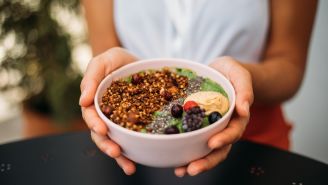Updated on May 31, 2023.
If you have inflammatory bowel disease (IBD), you may know that your risk for colorectal cancer is higher than average. In fact, research suggests that it’s the cause of death for 10 to 15 percent of people with IBD.
Many factors play a role in colorectal cancer risk, including vitamin D deficiency. This might help explain the connection to IBD. Since people with IBD have difficulty absorbing nutrients, vitamin D deficiency is common; about 6 in 10 people with IBD don’t get enough.
In one 2013 study published in Clinical Gastroenterology and Hepatology, for example, researchers looked at 11 years of data from 2,809 people with IBD and compared each person's vitamin D blood level with their risk for cancer. They found that people with low vitamin D were 69 percent more likely to develop cancer—especially colorectal cancer—than people with healthy levels of the vitamin. People with very low levels of vitamin D were 80 percent more likely to develop cancer.
The good news? In the study, even small increases in vitamin D levels were shown to lower a person's risk for colorectal cancer.
How to get vitamin D when you have IBD
The link between vitamin D and colorectal cancer needs more exploration, and while some research suggests getting enough of the nutrient may help people with IBD lower the risk of colorectal cancer, there's no definitive proof.
That said, a growing body of research suggests that adequate vitamin D intake can help manage IBD symptoms. Because of this, monitoring your vitamin D levels should be a standard part of your IBD care plan. If it isn’t, speak to your healthcare provider (HCP) about including this step in your routine appointments.
It’s recommended that all people with IBD take a vitamin D supplement, preferably with calcium. You can also get vitamin D via food and exposure to sunlight. Here’s how:
Food: Vitamin D is naturally found in only a few foods. In some fortified foods, such as milk or orange juice, the nutrient is added in later. While it can be difficult to get all the vitamin D you need from what you eat, the Crohn’s & Colitis Foundation recommends that people with IBD consider the following foods:
- Fatty fish such as rainbow trout, salmon, tuna, and sardines
- White mushrooms
- Eggs
- Fortified foods such as milk, yogurt, orange juice, and cereals
Note that some foods, such as milk, may affect symptoms in certain people with IBD. Speak with an HCP about the best choices for you.
Sunlight: One study published in PLOS One in 2019 found that winter and spring were linked to with lower vitamin D levels in IBD patients, potentially due to less sun exposure during these seasons. Though heading outdoors can help increase your intake, beware of spending too much time in the sun, as IBD is connected to a significantly higher risk of skin cancer. What’s more, certain medications used to treat IBD may increase your skin’s susceptibility to sun damage.
To reduce your risk of skin cancer, use sunscreen with an SPF of at least 30 that offers protection from both UVA and UVB rays. Wear clothes with SPF protection and a broad-brimmed hat when you go outdoors and look for shade or stay indoors between 10 a.m. and 2p.m., when sunlight is at its peak.
The importance of colorectal cancer screening
Whatever your vitamin D levels, be sure to go for regular colorectal cancer screening tests if you have IBD, as they are critical to detecting colorectal cancer early. Ask your HCP about how frequently you should be screened, which will depend largely on how long you’ve had IBD and the severity of your disease.







